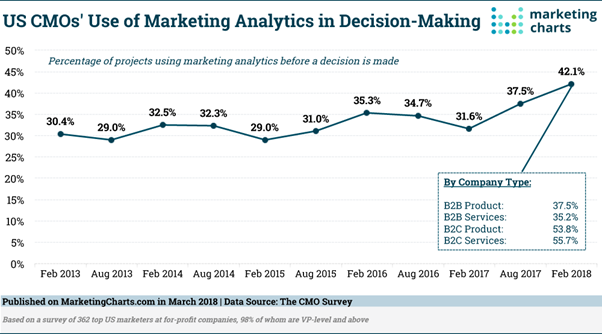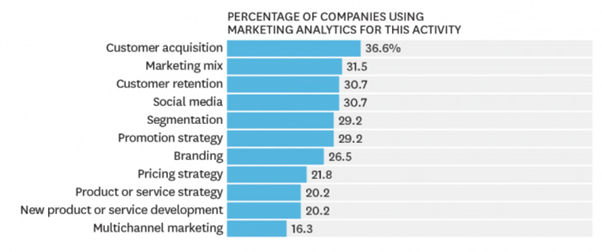Data-driven Digital Marketing
Digital marketing has evolved to encompass aspects of data analytics, technological understanding, and marketing strategy. In an increasingly data-driven world, marketing analytics has become a process of connecting marketing functions with business intelligence. Digital marketing professionals need to have the ability to analyse data, while extracting the critical insights to improve campaign performance. Influential marketing is now determined by analytics and big data, with decisions no longer solely based from hypothesis and experience. Marketing consulting firm, Forrester Research, found 44 percent of enterprises use data-analytics and mining to boost consumer response rates and generate insights that guide executives in developing relationship-driven strategies.

In applying data analytics and metrics to marketing strategies, businesses must first build an effective analytics strategy. Implementing a data-driven strategy starts from an organisational culture which manages its data well and values data analytics. Once the systems and people are in place to collect data, data analytics can be used to improve marketing performance with data-driven insights. A marketing analytics strategy must also be built from key business objectives and targets. This ensures data-influenced actions are aligned with key targets for long-term strategic advantage. Similarly, KPIs should be based on a set of relevant metrics and data insights, to ensure specific business processes can be tracked and are measurable. Establishing targets supported by data will assist in benchmarking against industry and forecasting indicators.
Marketers often have all the data they need, but struggle to filter out useful data and apply it to improve marketing performance. Digital marketers should constantly be looking for opportunities to use and apply data to improve performance. Data can also be used to learn about customers, from industry trends, website behaviour and potential customers. However, data must be comprehensive and accurate for making effective marketing decisions. All marketing initiatives should have goals, whether visitors to sites, registrations, email collections, or click-to-calls.

Boston Consulting Group found 58 percent of chief marketing officers (CMOs) believe that search engine optimisation (SEO), as well as email and mobile communications, are the areas where big data systems are have the largest impact on their organisations. SEO copywriting requires a technical understanding of search engines and writing copy that compels audiences to take action. Keyword search is similarly an effective tool in content to guide customers to what they are looking for. Big Data can identify how visitors are finding websites and optimise websites for customers to see the products they want when they arrive.
Data analysis can also be used to choose marketing channels. With consumers using mobiles, desktops, tablets, and smart watches, each platform has different behaviours and systems. Real-time data can also provide insights of insights of intent and mindset of audience. Better analytics lead to optimal design, allowing marketers to understand consumer preferences and engagement, to lower design costs and increase revenues. Data management platforms (DMP) can assist in achieving personalisation using web activity. When using different platforms, such as websites and apps, DMP can assist in combining data into a single customer view to provide a coherent customer experience across all digital properties.












